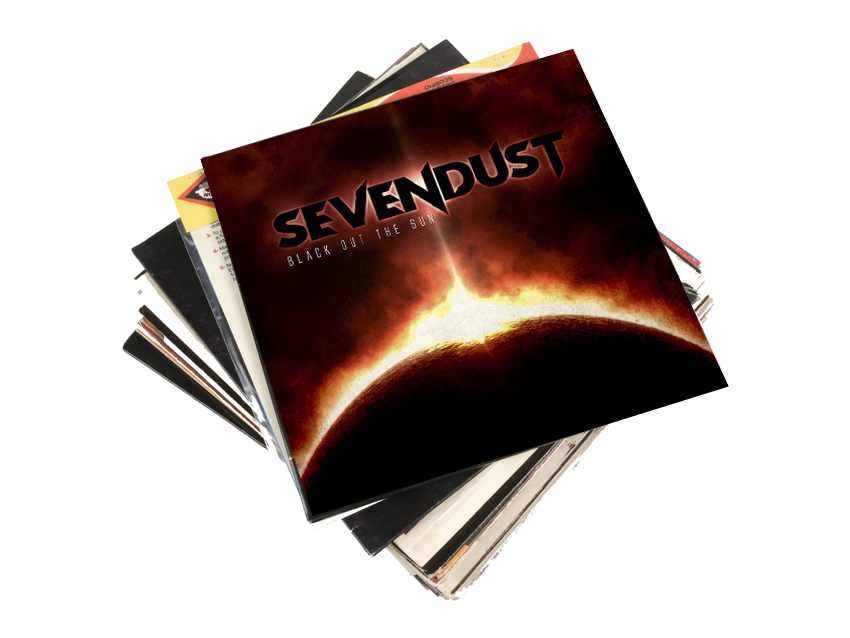
Sevendust's Clint Lowery and John Connolly talk new album, Black Out The Sun, track-by-track
The first thing Sevendust did when they decided to record a new album was to... not. After finishing a year-long tour in support of 2010's Cold Day Memory, the band members scattered, with guitarist Clint Lowery and drummer Morgan Rose forming the side project Call Me No One, while guitarist John Connolly and bassist Vincent Hornsby put together their own part-time band, Projected.
"There weren’t any issues or anything," says Connolly. "We all still love each other, and there’s tons of respect going on. But we’ve been burning Sevendust pretty hard for a long time. To do a new album, we wanted to come back charged up and refreshed."
Extracurricular activities completed, the band (which also includes singer Lajon Witherspoon) convened at Architekt Music Studios in Butler, New Jersey, with little in the way of demos. "It was pretty much a blank slate," says Lowery." Nonetheless, the band stunned themselves by writing and tracking an entire album, which they titled Black Out The Sun, in 30 days flat. "The last week was doing overdubs and tying up some loose ends," Connolly notes, chuckling, "so it might have been even less."
Both guitarists credit the time spent away from the band as one reason for their brisk pace in the studio. "We were all just glad to see one another again," says Connelly. "We were having fun with creating something from nothing."
Another contributing element, according to Lowery, was the fact that the band produced themselves, something they haven't done in full since 2005's Next. “If you look at our records, you’ll see producers listed," says Lowery. "But a lot of the production ideas, especially on Cold Day Memory, were ours. We’ve learned a lot from some of the guys we worked with, so we decided to take the reins ourselves this time. We know our band, and we push ourselves more than any outside producer can. I think it shows by what we came up with."
On the following pages, Connolly and Lowery run down the writing and recording of Black Out The Sun track-by-track. And be sure to click right here as the guitarists demonstrate how to play the band's new single, Decay, on video.
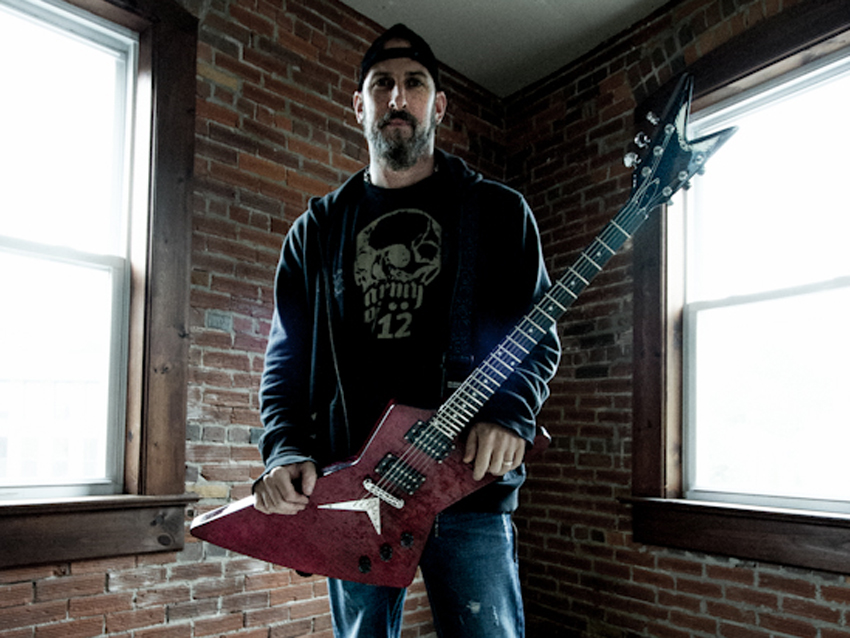
Memory
John Connolly: “Clint and I love old-school albums with those big, epic intros. We’re huge fans of things like Screaming For Vengeance and Master Of Puppets. Bands like Priest and Metallica always had that kind of setup; even if it was the most brutal record ever, there was something to suck you in and ease you into things before it got insane.
“The Call Me No One and the Projected records have intros like this, so we know how to do them; it felt natural. A lot of people are like, ‘Oh, I hate bands that do the intros,’ but they’re our guilty pleasures. We were going to do this thing.
“It was a piece of music that came out of Clint noodling around for the song Faithless. This is one of parts that didn’t make it. We basically took the piece and moved it up to the beginning of the record. Then we built it and built it and built it.
“I used my signature Dean Z for probably 97.2 percent of the record, so I’m sure I used it here. Clint had his PRS models pretty much. We had a couple of Strats in the studio that were cool for certain things. Most of the time, it was me with a Dean and Clint with a PRS.”
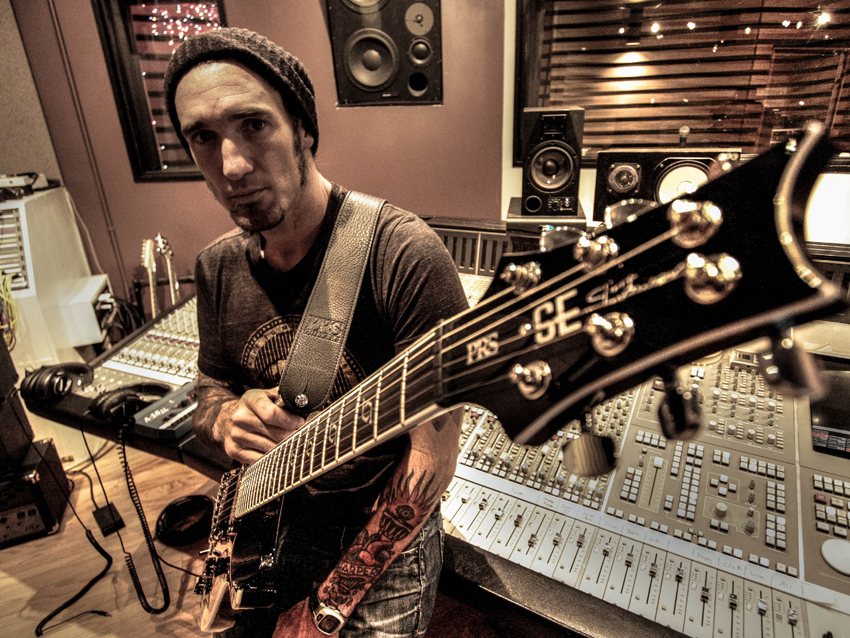
Faithless
Clint Lowery: “We knew that we wanted an epic tribute to the songs we grew up on – stuff by Judas Priest and a few other bands. I’m talking about those big, over-the-top intros. It’s one of those songs that started out from an off-time riff that I had, and then it developed into this very melodic verse.
“There was also this blast-beat thing that Morgan was doing. I recorded him playing it, thinking that I wanted it to start out super-heavy and then be hard but melodic, kind of like an ‘80s metal song. It’s a trip, very much Sevendust 101."
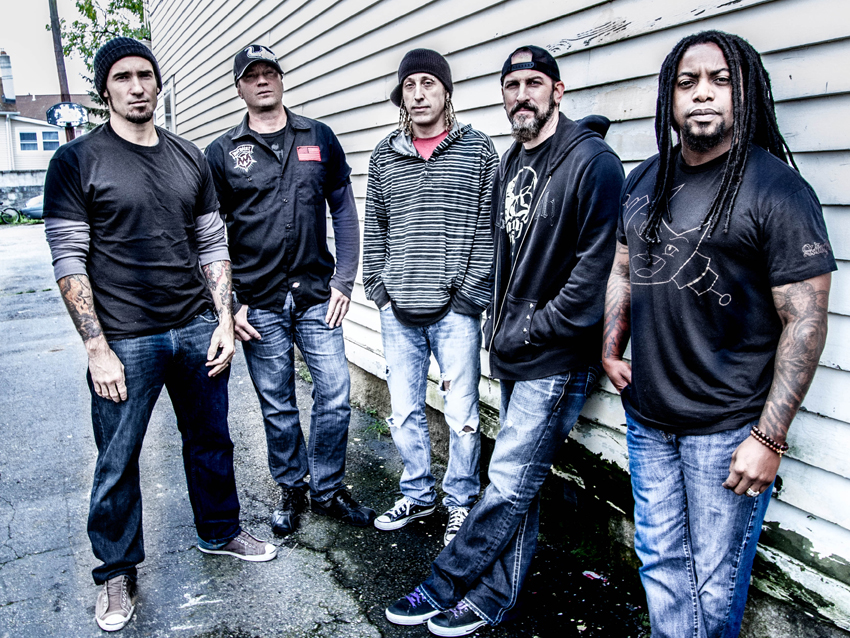
Till Death
John Connolly: “It’s a super-heavy song. We knew we wanted something like that on the record. We had the verse riff, we had the heavy riff, but we didn’t have a cool chorus; we kind of sat there for a minute with this one riff – it was kind of good, it was pointed in the right direction, but it wasn’t there all the way.
“We kept jamming it and jamming it, and all of a sudden – boom! That chorus just popped out. We all knew it when it happened. You get the chills and the hair is standing up on the back of your neck. I love when that happens.
“This is us staying attached to what we love the most. I mean, we loved doing the Angel’s Son songs, and we love doing acoustic stuff, but there’s something really cool about laying down a really brutal track.
“The chorus has a lot of interesting guitar parts. I do the high, over-the-top thing. Clint does a super, super-high, really atonal part that’s kind of in the background, and I do another higher part that’s very melodic. Vinnie does a lower part, too – actually, we both played that. Sometimes it’s a coin toss as to which one we really need. A lot going on.
“The guitar solo was really cool to do. We basically hooked up nine or 10 pedals in sequence, and as I played the guitar, Clint kind of rolled around on the floor, moving knobs and pushing buttons, doing all sorts of random things. There’s no way to duplicate it live.”
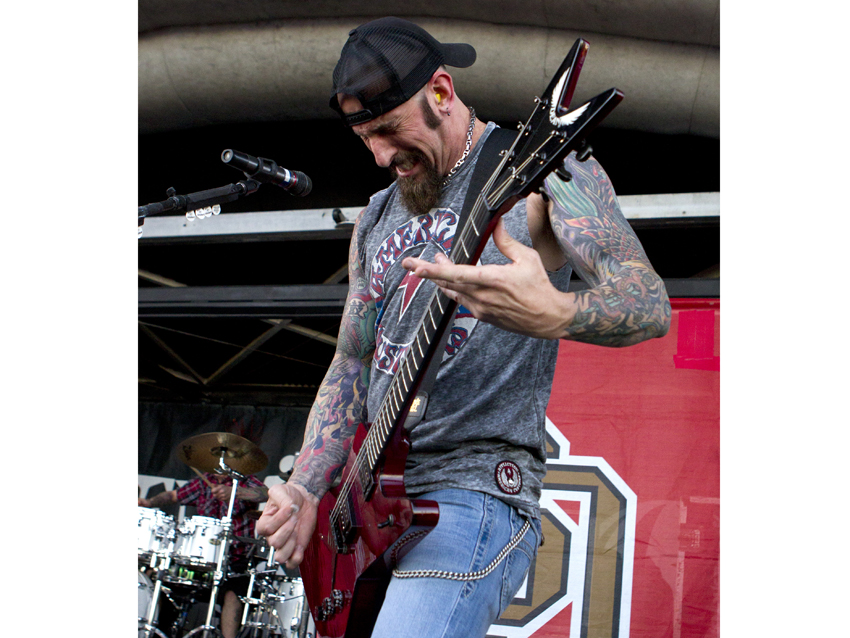
Mountain
Clint Lowery: “We explored different tempos and feels on the drums. I had the idea of a swing kind of beat that would be contrasted with metal, so you’ve got this Southern swing swagger that goes with this really low, menacing guitar riff. We turned down to a drop D, but on the low string I went down to an A. It’s pretty cool.
“I didn’t want the verse to slow down that much, but the chorus is complete Sabbath meets Mastodon. I’m really into those bands, the way they can shift from one tempo to the next and how they can rock hard before the doom and gloom aspect.”
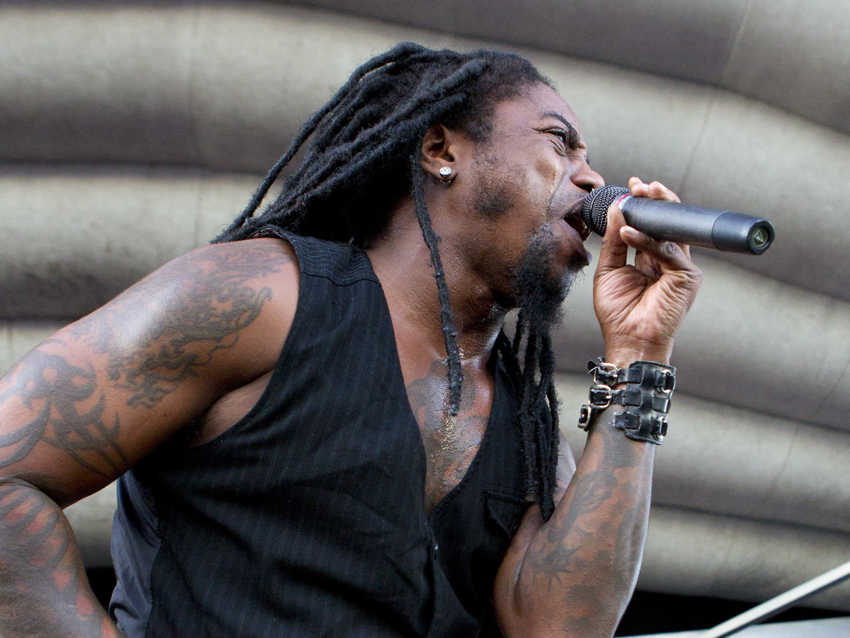
Cold As War
John Connolly: “It wasn’t the first song we did for the record, but it was the first one that we completed vocally. For that reason, it’s probably one of LJ’s favorites on the album.
“There are some ‘demo moments’ on it, but we did what Sevendust always does – you bring the frame of a house in, and we just completely finish everything. It was a lot of fun, a little different, and obviously it’s very different from songs like Till Death or Murder Bar. It has a lot more of the melodic element. Compared to some things, it’s very radio.
“Lyrically, I think it’s hopeful. The whole album has a dark take to it – we’re looking at the harshness of where we are in the world. But as bad as things can seem, we’re trying to say that there is some light out there. There is hope, even though we love to dwell on the negativity. [Laughs]
“There’s not a person in this band who doesn’t like to write about something that’s got ‘em pissed off, but we’re not Slayer. This is not a God Hates Us All kind of a record. Our attitude is, ‘God’s pissed, but we can fix it.’”
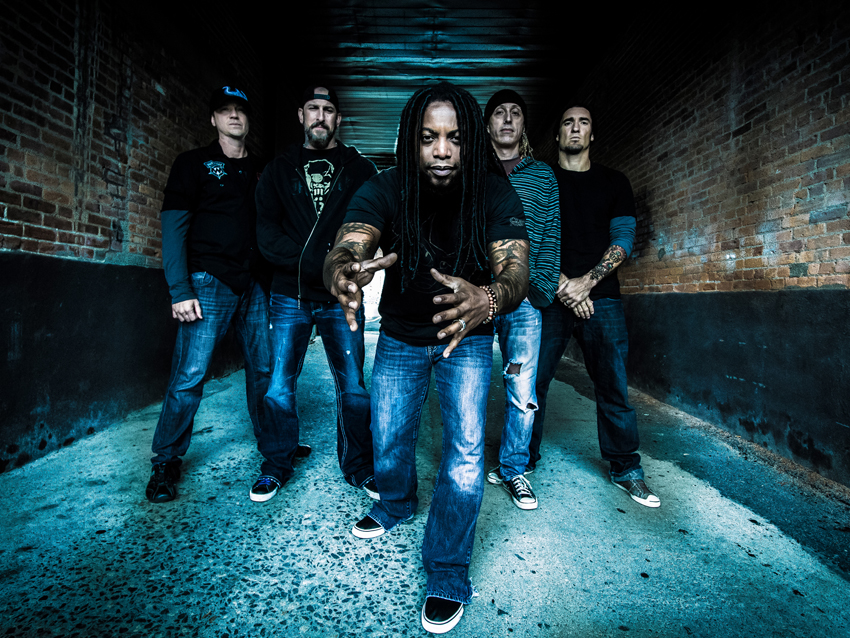
Black Out The Sun
Clint Lowery: “I was writing a couple of riffs at home, and I wanted a real straight-four kind of rock song. I thought it would be cool to keep it right down the center, something that presented itself well for vocals.
“We got this together pretty quickly. There was a session guy in the studio, so he played while we wrote the song out. Morgan was at his grandmother’s funeral when we put the track together, but when he came back, he sat down and knocked it right out.
“Lyrically, the song is pretty close to me. My father had passed away last May, and I felt like writing about how angry I felt, about being mad at God and the whole process of losing people. Death is supposed to be this natural thing that you have to accept, but it’s difficult. My dad was sick for a while, and I was making progress at building a connection with him even though he wasn’t mentally able to understand what was going on. It was getting better, our relationship... and then he died.
“Hearing Lajon use that line, ‘Black out the sun,’ made me really think about what I wanted to say. I’m not mad at God, but I am asking Him, ‘Why did you have to take my dad?’”
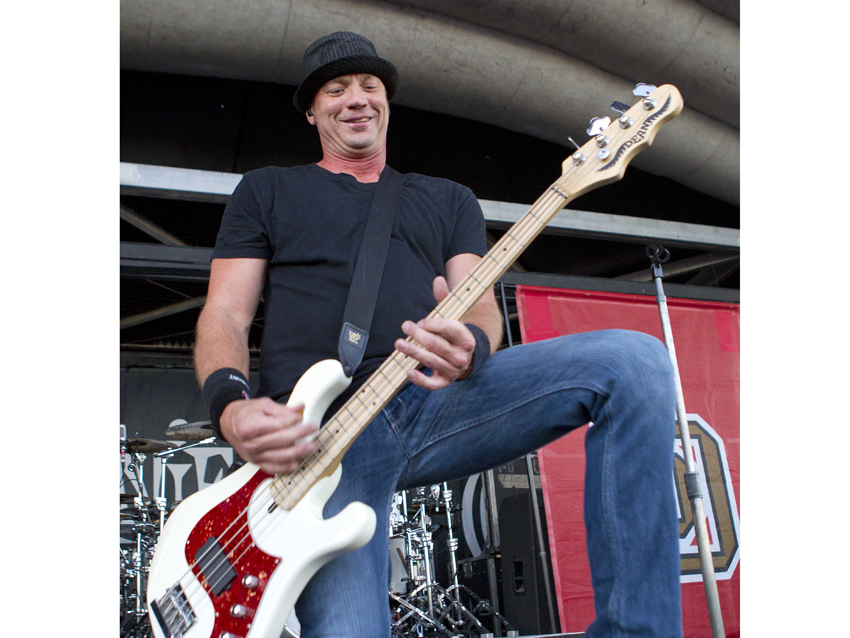
Nobody Wants It
Clint Lowery: “Musically, it’s straight-up Sevendust. We left some holes for the vocals to do their thing in the verses. The song is us poking fun at society in that nobody wants to hear the truth; they love propaganda and filters, hype and sugar-coated realities. People would rather hear a mass lie than what’s really going on. We can all be guilty of that from time to time.
“We start out with this menacing, palm-muted part that matches up with the drums. In the verse, there are these really cool, punchy guitar riffs, and in the chorus there’s an off-time thing that gets very open and grand. It’s epic, man. In that chorus, there’s a percussive, harmonic riff for one layer, and then there’s another part that’s more of a strum – that one carries the melody.
“I like mixing those kinds of guitar parts, the percussive and the melodic bits. They give your ears a lot to dive into, and they create this nice bed for the vocals.”

Dead Roses
Clint Lowery: “We wanted a quirky song. It’s got a really quirky guitar-bend riff in the beginning, and I love the chords – they have a minor, classical-sounding element to them.
“The chorus had completely different music at first, which I wasn’t really down with, staying on that one root note the whole time; the vocals just didn’t sound that interesting. I changed some of the chord movements, and everything changed for the better. Even though the vocals stayed the same, they sounded different in a really good way. They just needed a new landscape.”
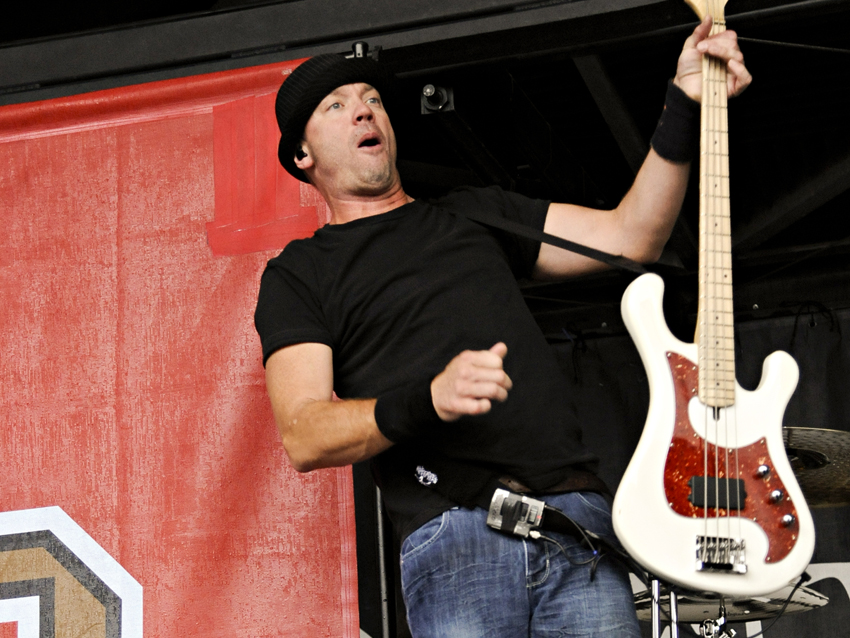
Decay
John Connolly: “We almost put this song on the last record. You can never tell when something is just a piece of music. You might think something is a song, but until you sing over it, you don’t really know.
“This piece of music came around when we were doing Cold Day Memory, and for whatever reason, Johnny K just wasn’t hearing it. He said it was a little basic; he thought it sounded like us, but to him it wasn’t quite up there with the other things we were doing. So we tabled it. As I said, it’s not really a song until LJ gets hold of it and proves to us that it deserves to be on a record.
“It went to the back of the pile and sat there for a while, and what’s funny is, we did it last. We finished the new album, but we decided to get a few songs more done, just for fun. We were kind of burnt with working up new riffs and doing a song a day, so we took a look around, and there it was. We pulled up the file, listened to it, and Clint and I said, ‘Man, we could get this thing worked up in about 30 minutes.’
“Everybody was down with it, thinking we had a cool bonus track or a B-side. That’s how we approached it. We knocked the music out, and once we got to the singing, Vinnie threw his arms up and said, ‘I think this is the single!’ Sure enough, it was the sleeper. It always works out that way with this band.
“Even though we started it some years ago, the vocal made everything sound very fresh. The music was doing what it was always supposed to do, but the vocal line brought it to a really great place. There’s a reason why something sticks around – it’s meant to be. Needless to say, this one was a pleasant surprise.”
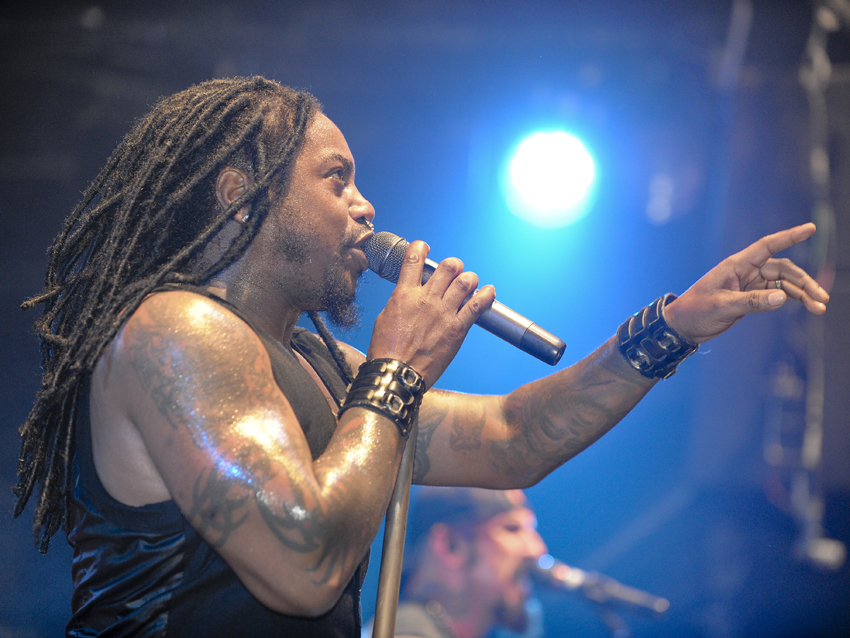
Dark AM
Clint Lowery: “I had this makeshift programming thing going on, and I was just noodling around over it before the song actually starts. These cool things started coming out, so I left it on there. That’s when the ‘demo-itis’ kind of kicked in – I couldn’t imagine the song without that little riff anymore. So we decided to keep it and add little things to it.
“The opening riff, we were going for a Pantera kind of Walk sound, but it turned into a more radio-friendly version of that.
“The song is about a very volatile relationship between two people, the way you can actually come alive during a passionate argument…even though you’re going crazy.”
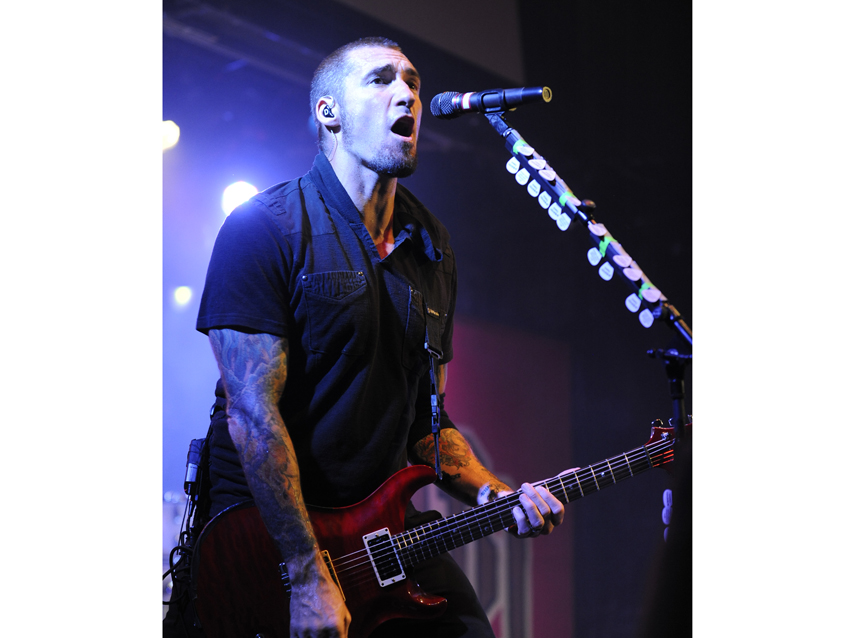
Picture Perfect
John Connolly: “This song is cool, man. This was one of the earliest riffs that we worked on. The main riff was on one of Clint’s demos – it’s very Clint Lowery, and it’s awesome. It had this real dirty, almost Nine Inch Nails-like vibe to it.
“What’s funny is, I don’t know if Clint got to write at all past the riff, because once Morgan and I got our hands on it, we went for it. Lajon came up with the ‘picture perfect’ line, and it was just killer. It was the melody, it was the note, it was everything – the whole deal. We took it to Clint, and he was blown away. I think he wasn’t seeing past the riff, which can happen. But without the riff, we wouldn’t have had anything.
“It’s one of my favorite songs. It’s not super-heavy, it’s dirty – dirty in a different way. It’s not a metal kind of heavy, which is totally cool.
“The separation, the loss, the looking back – emotionally, the song is talking about being wronged by somebody. But at the end of the day, it’s about your own point of view. Your picture-perfect point of view is the only one you’ve got. LJ hit that line, and we knew we had a special song.”
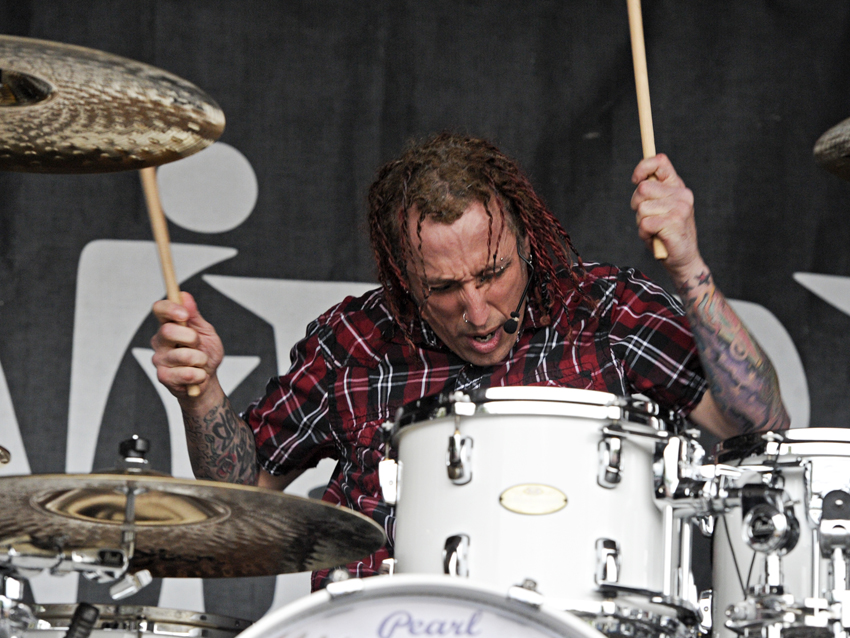
Got A Feeling
Clint Lowery: “When it comes to ballads, we always seem to have certain songs that can stand on their own, things like Angel’s Sons. They’re really cool acoustic, melodic songs, sort of depressing sounding [laughs].
“I had this riff sitting around, something I recorded on my phone, actually. Morgan liked it a lot, so I kept it. We wanted a song where we all sing, sort of our version of Fleetwood Mac. I wanted to build it up from the acoustics, so we did that, put in the programming, and Morgan’s parts were put on last.
“We had a melody, and the ‘got a feeling’ lyric kept coming up, so we decided to make every verse, every line, this thought that you’d have during the day. It’s basically a stream of consciousness about how harsh life can be. Also, there’s a theme about how you’ve made mistakes, but you don’t even know if you have time to make amends because life just goes by so quickly.
“It’s a very emotional song, and it’s one of my favorites because it’s so personal. I think it’s great that everybody sings on it. It’s intense.”
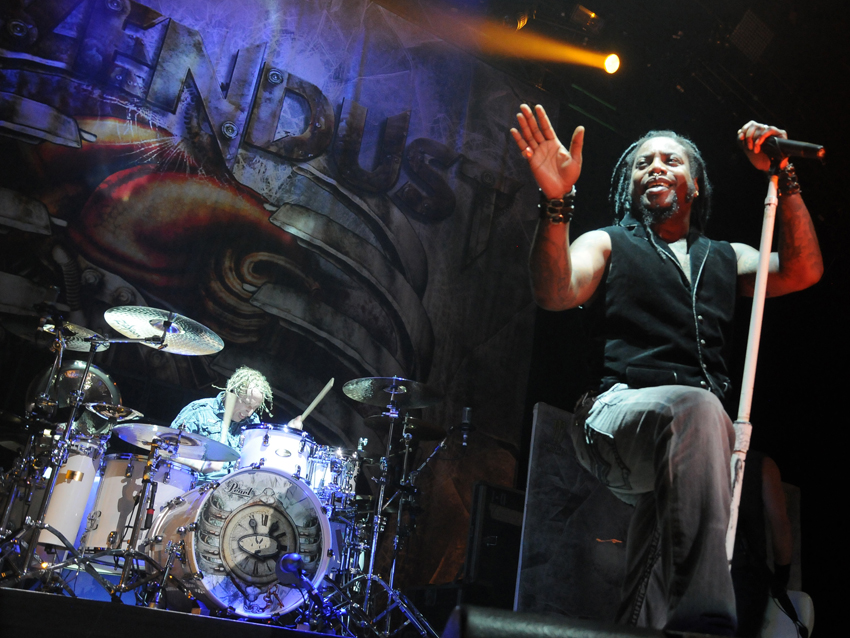
Murder Bar
“Ironically, it’s the first song we wrote, but we put it last on the record. It had that final seal of approval vibe to it. We like to end albums with something kind of driving. It’s probably a little more old-school Sevendust.
“We wrote this the day we got to New Jersey. Morgan was already in the studio working with Wolfie Van Halen – they were doing some demos – and he got the call that his grandmother had passed away. We literally passed him in the air as we were flying in and he was going to Atlanta for the funeral and services.
“We got there and decided to get everything set up so that when Morgan got back, he’d be ready to go. We kept it real low-key, but we set up the MIDI controller, the speakers, the keyboards and the Axe-Fx, and 30 minutes later, that song was there. We all hammered it out, and I think LJ was playing the drums on the keyboards for half of it. When Morgan came back, he heard it and was like, ‘Holy shit!’ We immediately got to jamming on it with him.
“It’s a funny story why we called the song Murder Bar. The day we got to the studio, George, the owner of the place, kind of gave us the tour of where we’d be staying and what was around the area. He pointed to this house and said, ‘Whatever you do, don’t go in there. You’ll get murdered!’ We thought he was kidding, but he said, ‘I’m telling you the truth. All the murderers and pedophiles and rapists in New Jersey hang out there.’
“So, of course, LJ and I were getting hungry, and we said, ‘Hey, let’s go hit the Murder Bar.’ We walked in, and there were two pool tables, a karaoke machine and maybe four people in the place. It was the most unassuming joint you could imagine. It’s a local watering hole, and that’s it. No trouble at all.
“We told George that we went there, and he was like, ‘No, you didn’t! I told you not to go in there.’ But it’s not actually called the Murder Bar; the real name of the place is Roar Of The Crowd. Check it out – Roar Of The Crowd in Butler, New Jersey. Bob Seger is on the jukebox, people are playing darts – it’s totally safe. We even held our listening party there.”
Joe is a freelance journalist who has, over the past few decades, interviewed hundreds of guitarists for Guitar World, Guitar Player, MusicRadar and Classic Rock. He is also a former editor of Guitar World, contributing writer for Guitar Aficionado and VP of A&R for Island Records. He’s an enthusiastic guitarist, but he’s nowhere near the likes of the people he interviews. Surprisingly, his skills are more suited to the drums. If you need a drummer for your Beatles tribute band, look him up.
